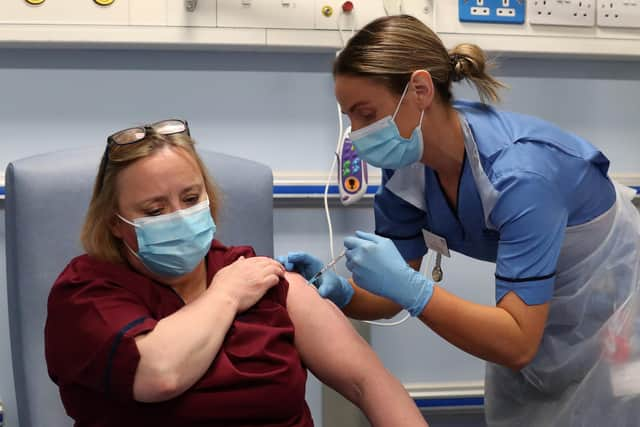Scottish health chief says government should not 'break promise' of second vaccine dose plan
Changes were made to the vaccine dose rollout just before New Year which meant patients who had previously been scheduled to receive a second dose three to four weeks after the first will now be given the two doses up to 12 weeks apart.
Chairman of British Medical Association Scotland Lewis Morrison said the delay has been seen as a “broken promise” and has put the trust of medical staff “in jeopardy.”
Advertisement
Hide AdAdvertisement
Hide AdHe said: “Since this change was announced without any real consultation just before New Year, we have heard from many of our members and I have heard directly from my colleagues how let down they feel and some would say betrayed.
"They feel potentially more, not less, exposed to serious risk as a result. They don’t believe the evidence supports the delay to the second dose of the Pfizer vaccine, and they are fearful it won’t be available when 12 long weeks have passed.
"Our clear view is that second doses of the Pfizer vaccine should be reinstated and honoured for those whose appointments had been made.
"Our message on behalf of the profession and those we care for is that the Scottish Government must deliver on the promise made and the treatment those people who have had their first dose consented to, and not break that promise or alter the treatment half way through.
He claimed experts in the “vast majority of countries” are sticking with the original two dose schedule.


“There has not, in BMA Scotland’s view, been a compelling enough case made to change course in this respect,” he added.
Mr Morrison’s announcement comes the day First Minister Nicola Sturgeon confirmed the country will be entering a strict lockdown from January 5.
The health chief said the new measures make vaccinating NHS staff “vital” in protecting them as they continue to put themselves at risk during the pandemic.
Advertisement
Hide AdAdvertisement
Hide Ad"This risk is not just to themselves,” he said, “but also to their loved ones, who they return home to after doing all they can to care for patients.
"They all deserve protection, and as soon as possible.”
Nicola Sturgeon said the new vaccine dose guidance comes from the four-nation Joint Committee on Vaccination and Immunisation.
In an address to MSPs on Monday, Ms Sturgeon said: “Our current expectation, based on assumptions about supply and the new advice on doses being administered up to 12 weeks apart, rather than three, is that by early May everyone over 50, and people under 50 with specific underlying conditions, will have received at least the first dose of vaccine.
"That is everyone who is on the JCVI priority list, and comprises more than 2.5 million people.
“Once everyone on the priority list has been vaccinated, we will start vaccinating the rest of the population, and will do this in parallel with completing second doses for those on the priority list.”
She added: “I have tasked our vaccination team with exploring and keeping under ongoing review all options to speed up the rate of vaccination and bring these timescales forward as far as possible.”
A message from the Editor:
Thank you for reading this article. We're more reliant on your support than ever as the shift in consumer habits brought about by Coronavirus impacts our advertisers.
If you haven't already, please consider supporting our trusted, fact-checked journalism by taking out a digital subscription.
Comments
Want to join the conversation? Please or to comment on this article.